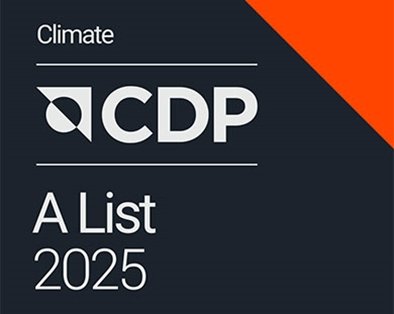By Joakim Reiter, External Affairs Director, Vodafone Group
Today, Europe’s industrial leaders voice their support for the EU climate goals, in addition to suggestions on how, as an industry, we can help fuel the all-important Green Deal and make our economy sustainable. ERT’s endorsement of the Green Deal’s net-zero target is a strong signal of support from 57 business leaders across some of Europe’s largest industrial and tech companies for a climate-neutral Europe by 2050 and a net greenhouse gas emissions reduction target of 55% by 2030, underpinned by a robust industrial policy.
Approaching the fifth anniversary of the Paris Agreement
It’s crucial, however, that words of support are coupled with concrete actions and recommendations that will enable business and government to secure a successful green transition and address our climate issues collectively. With tomorrow marking the fifth anniversary of the Paris Agreement, this comes at a poignant time.
At its core, the Paris Agreement strives to strengthen the global response to the threat of climate change - an existential threat to inhabitants and ecosystems around the world. As we reach the end of a year that has been so tumultuous, challenging, unpredictable and yet productive against the odds, we reflect on what has been achieved and, crucially, what more can be done to reduce our carbon footprint. Our eyes, as well as those in positions of political influence, remain focused on digital technologies and their ability to help tackle the climate crisis.
In the last five years, governments, businesses, charities and people have collectively contributed towards the Paris Agreement’s goals of keeping the global temperature rise below 1.5 degrees Celsius above pre-industrial levels. This year, Vodafone committed to reducing its total global carbon emissions to ‘net zero’ by 2040 and confirmed that its 2030 carbon reduction targets have been approved by the Science Based Targets initiative as being in line with the most ambitious goal of the Paris Agreement.
Science Based Targets – we are not alone
We are one of over 500 companies to have their greenhouse gas emissions reduction targets validated by the SBTi. Whilst we are one of the first major telecoms operators to develop science-based targets that follow the pathway recently developed for the information and communication technology sector through a collaboration between ITU, GeSI, the GSMA, and the Science Based Targets initiative, we are certainly not alone in our efforts.
The ERT publication today is further evidence of alignment across industries and lays out some key actions that we need to take to seize the transformative opportunities envisioned by the Green Deal. To secure a successful green transition, the ERT has identified, among others, the following key enablers:
Align investments in the recovery with the transition towards climate-neutrality. Use the EU recovery funds to foster the transition to climate neutrality, a digital economy and circularity.
Digital solutions are indispensable to empower progress towards the Green Deal’s aims. Digital and connectivity solutions provide a huge potential for efficiency improvements and economic benefits.
The availability of sufficient and clean energy at a competitive cost is vital to the success of the green transition not least because the decarbonisation of Europe’s industry will involve a step-change increase in clean energy demand.
Drive demand for low-carbon products by informing the end-users and by providing incentives to make the business case for upscaling production and creating markets in key sectors.
A price must be put on all carbon emissions to incentivise all actors along the value chain to cut emissions, including looking at sectoral specificities and defining for each sector of the economy how a carbon price can be set most effectively.
The fact is, never before have the funds been available, the technology ready and the willpower from EU leadership present to drive change and enable a greener future. This much was evident during discussions at the EU Summit this week and the EU pledging to allocate 37% of the Recovery and Resilience Facility fund to drive green investments and reforms, with 20% allocated to foster the digital transition. The Commission understands that digital technologies can help create transparent ecosystems and power a much-needed step change by unlocking the potential of Artificial Intelligence, automation, Internet of Things (IoT) and more.
Individual company efforts are a key cog in the wheel, churning society on towards sustainability
This year alone Vodafone has brought forward to July 2021, our commitment to power our entire European network with 100% renewable electricity. We’ve enshrined new environmental criteria into our choice of suppliers. And crucially, we have an ambitious new target to help our business customers reduce their own emissions through our services: enabling the savings of 350m tCO2e between now and 2030 – the equivalent of Italy’s carbon footprint in 2019. We will do this mainly through our IoT offer – including smart meters, smart logistics, and precision agriculture.
Our commitment to action and transparency has been recognised by global environmental non-profit CDP, securing a place on its prestigious ‘A List’ for tackling climate change. We are one of many companies that take eliminating our carbon footprint seriously, finding new ways to drive efficiencies and challenging ourselves to do better, always. And we also have a great opportunity to help decarbonise other sectors in society and drive more efficient use of natural resources.
But it is by working together that we can truly make a difference
Whilst company actions make a real difference, it is by partnering individual efforts with joint goals that we can take the green transition to the next level. As highlighted in the European Climate Pact this week, five years after the Paris Agreement on climate change, we must move faster if we are to prevent irreversible and catastrophic climate change and limit global warming to well below 2°C. This new Pact will help ensure development, implementation and scaling up of solutions so that we can build a greener Europe, not in silos, but together.
We’ve made vital progress during the past five years, but our challenge continues as we approach 2021. By continuing to collaborate and unify our efforts across Europe, I feel confident we can achieve our goals.

























